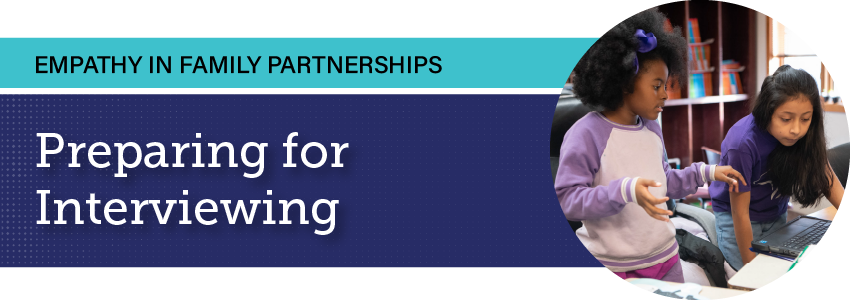CDE will be closed on Monday, September 1, for the Labor Day holiday.
You are here
Module 3: Engaging in Family Interviewing

Learning Objectives:
- Learn how to incorporate a family’s cultural background into family interviewing.
- Learn how to create a mutually trusting and supportive environment within an interview.
- Implement strength and asset-based language when conducting family interviews.
It is essential to create a trusting relationship so that you can partner with parents to meet mutual goals of improving child academic, social, emotional, and mental health outcomes. There are several essential family interviewing skills that will help you build trusting and close relationships with families from culturally and linguistically diverse backgrounds.
Practicing empathy is always first and foremost in family interviews. Families from historically marginalized backgrounds may have particularly negative experiences with the education system due to systemic inequities and educator biases. Thus, it is essential to consider how to establish a welcoming atmosphere and build trust with the family during the interview process. This may include making changes to the interview setting (home, school, a community venue such as a public library, via phone or video call), providing the family with an interpreter if an individual who speaks their home language is unavailable, allowing for flexibility in the interview content (i.e., changing a topic if a family member is uncomfortable with the questions, allowing more space for a topic than originally planned if a family member would like to share). It is also critical to practice empathetic listening skills, including:
- Pay attention to body language, tone of voice, and facial expressions in addition to content to obtain a holistic understanding of what an individual is sharing
- Use nonverbal communication like eye contact, nodding, and facial expressions to show your engagement. Recognize that nonverbal communication may differ by cultural expectations.
- Restate and rephrase what a person tells you, and ask if you are understanding them correctly
- Paraphrase or summarize what a person says to reflect meaning
Using NURSE statements are particularly effective for articulating empathetic listening; see the linked guide for more details. Additionally, the Crisis Prevention Institute provides more tips for empathetic listening.
It is also important to incorporate a family’s culture into the interview. Family culture means something different to each family, so the best policy is to ask the family about their own culture! See the example questions for ideas. Focus on the child’s strengths by asking the family about goals and preferred activities. Because each family is unique, you may not always say the right thing, and you may misunderstand a family member. At the beginning of an interview, let the family know that you are hoping to understand their child and their experiences - invite them to engage and provide multiple opportunities to check for understanding and provide clarification when needed.
Reflection Questions
- What are your current strengths related to connecting with families during interviews?
- How can you improve your relationships with families of culturally and linguistically diverse backgrounds during interviewing?
- What questions relating to culture for children with exceptionalities may be particularly important and/or unique to your school community?
Having trouble with this webpage?
If you have problems with broken links or accessing the content on this page, please contact the Exceptional Student Services Unit at ESSU@cde.state.co.us. Please copy the URL link for this page into the email when referencing the problem you are experiencing.




Connect With Us





